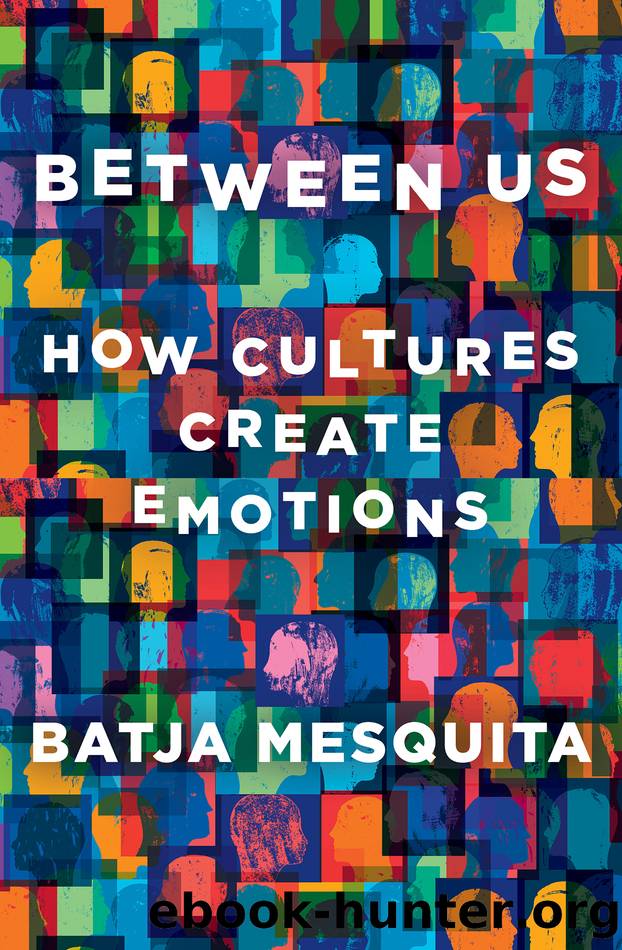Between Us by Batja Mesquita

Author:Batja Mesquita [Mesquita, Batja]
Language: eng
Format: epub
ISBN: 9781324002475
Publisher: Norton
Published: 2022-06-13T00:00:00+00:00
Influencing Others
Within a culture, emotion concepts enable you to communicate with other people in your culture: first your parents, and then a widening circle of people. By naming my emotion, I am invoking the cultural episodes that go with that emotion, as we all know them, to influence you and our relationship. Which episodes will come online depends on our relationship and on the particular context, but by talking about my emotion, I am piggybacking on all the things you and I, and many other people in our culture, know about these emotions.
In my culture, telling my husband I am mad that he is late for dinner is a way of warning him that I wonât accept his behavior, that I blame him, and that I think I am right, and in the position to expect him to treat me better. By saying I am angry, I am taking a stance in the relationship. Psychologist Brian Parkinson makes the interesting suggestion that saying I am mad is even more powerful than just saying that I donât accept his behavior, because anger âsends the message that I may not be able to stop myself from following through if the situation does not change, that my action impulse has a momentum of its own.â Thus, âmy angry warning of aggression may constitute a compelling threat.â Of course, anger episodes may have many different endings, but if in your culture, or within your relationship, aggression is a likely ending of the anger story, then saying you are angry may add some force. The urge to act is an indisputable characteristic of the emotion story. Others may indeed infer that not acting is no option.
Similarly, hasham does not only help an Egyptian Bedouin woman to âwriteâ the story, but also to communicate it to others. And in doing so, it helps to achieve the very goal of hasham: to convey that you defer. Saying you are hasham may be just as powerful as casting your eyes down, avoiding any contact, or disappearing. And again, saying you are hasham is particularly useful because it communicates what we all know to be the right response.
There are many other examples. When I tell my partner I feel guilty about something I have done (or not done) that caused them distress, I convey the very script of feeling guilt: my commitment to the relationship, and my preparedness to make up for my wrongdoings. When I tell someone I love them, the very act of saying it works towards the script of romantic love: to give them attention, and to seek closeness. Of course, we can feel guilt and love without saying it, but saying it is âactingâ: saying it is working towards the goal of the emotion, which in the case of both love and guilt is (re)commitment to the relationship.
There are also times when saying you feel an emotion is nothing more than acting. Saying âMommy is angryâ is primarily an effective way of conveying your nonacceptance. It does not rule out you have angry feelings, but whether or not you do is inconsequential.
Download
This site does not store any files on its server. We only index and link to content provided by other sites. Please contact the content providers to delete copyright contents if any and email us, we'll remove relevant links or contents immediately.
Should I Stay or Should I Go? by Ramani Durvasula(7639)
Why We Sleep: Unlocking the Power of Sleep and Dreams by Matthew Walker(6684)
Fear by Osho(4720)
Flow by Mihaly Csikszentmihalyi(4665)
Rising Strong by Brene Brown(4431)
Why We Sleep by Matthew Walker(4420)
The Hacking of the American Mind by Robert H. Lustig(4355)
How to Change Your Mind by Michael Pollan(4338)
Too Much and Not the Mood by Durga Chew-Bose(4319)
Lost Connections by Johann Hari(4160)
He's Just Not That Into You by Greg Behrendt & Liz Tuccillo(3871)
Evolve Your Brain by Joe Dispenza(3650)
The Courage to Be Disliked by Ichiro Kishimi & Fumitake Koga(3468)
Crazy Is My Superpower by A.J. Mendez Brooks(3378)
In Cold Blood by Truman Capote(3365)
Resisting Happiness by Matthew Kelly(3331)
What If This Were Enough? by Heather Havrilesky(3297)
The Book of Human Emotions by Tiffany Watt Smith(3282)
Descartes' Error by Antonio Damasio(3261)
